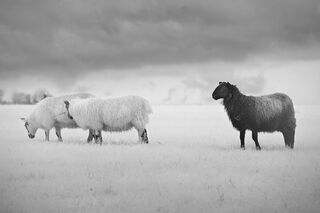DSM
The Power of Being “The Black Sheep” of the Family
Part 1: There may be hurt, but also opportunity.
Posted January 17, 2022 Reviewed by Gary Drevitch
Key points
- The term black sheep is most often used to describe the feeling of being the odd one out in one's family of origin.
- Black-sheep or scapegoat archetypes are prevalent in cultures worldwide.
- The black sheep may be the scapegoat for a family’s dysfunctional patterning, analogous to the "identified patient" in Family Systems Theory.

One of the hardest realizations that many of us face on our healing journeys is the thought—and all the feelings that come with it—in which we come to realize that we’re the black sheep of our family of origin, or of our peers, childhood religious institution, or early community.
Maybe there’s always been a nagging sense of feeling like the odd one out—like the proverbial ugly stepsister. Or a sense of feeling a bit orphaned. Feeling like the lone wolf. Or a sense of being the scapegoat.
Maybe it’s because you felt, understood, and responded to things differently than other members of your family/peer group/community.
Maybe it’s because you looked or sounded different.
Maybe your life choices went against the grain of what was “normal” where you grew up—whether it's because you spoke up when others didn’t, moved away from your hometown, or chose to love, and work, differently.
So maybe your sense of feeling like the black sheep was subtle and implicit—nothing directly said out loud but rather always a slight sense of the back of your mind and heart.
Or maybe your feeling of being the black sheep was more explicit and you were physically and relationally rejected by your family of origin, church, or early community, for who you are and how you move through the world.
Maybe you were disowned, emotionally cut off, kicked out of your house, or treated visibly differently.
However and for whatever reasons this may have manifested for you, many of us can identify with “the black sheep” archetype and, while this is predominantly a pejorative term in our collective lexicon, this post is all about reclaiming the power of that archetype—diving deep into what it may mean to be the so-called “black sheep” from both a cultural and psychological lens, exploring the pain of what it can mean to embody this archetype, but also the power, gifts, and opportunities it offers.
Let’s be clear: "Black sheep” isn’t a term listed in the Diagnostic and Statistical Manual of Mental Disorders, the bedrock diagnostic book for mental health clinicians. And there isn't one single, universally-agreed-upon definition of the term, either— certainly not a clinical one—but it’s nonetheless a phrase that infuses our collective cultural lexicon.
The phrase originally and objectively described what happened when a recessive gene resulted in the birth of a sheep with black rather than white coloring. Obviously, these black sheep stood out from the flock, and, apparently, their wool was traditionally considered less valuable. (The not-so-subtle devaluation begins…) Around the 18th century, some suggest, is when the pejorative nature of the term as we have come to understand it today came about: It became an idiom meant to imply waywardness. These days, “black sheep” is a term that may be used by others to describe us (or for us to self-describe) if we seem like the odd one out in any way from our family of origin or early community.
And still, there are many different definitions for this phrase depending on the school of thought one consults. From a Family Systems Theory perspective—introduced by Murray Bowen in the mid-20th-century—the family is an emotional unit and a system within which one could say that the proverbial black sheep (not Bowen's term) is analogous to the “identified patient.”
The identified patient is part of a family’s collective, unconscious psychological projection process in which they essentially defer and outsource the pain, tension, and anxiety felt within their dysfunctional system onto one person who then psychologically, and sometimes physically, “holds” the emotional energy of the family, manifesting it in symptoms and behaviors that the other members of the group can point to and say, “There’s the problem! It’s her, not us!”
In this way, the identified patient could be seen as the family scapegoat, serving as a “protective function” for its larger dysfunctional patterning.
From an archetypal psychological perspective, “the black sheep” may most closely resemble “the orphan” archetype, or that of “the abandoned child." These archetypes are, in essence, recurring symbols or motifs that describe someone, or an aspect of someone, who doesn’t feel like they fit in with their family or community of origin, physically or spiritually, and perhaps because they do not seem to fit, the group's "shadow" is projected onto them. Showing up across myths, legends, and fairy tales since time immemorial, “the orphan” and “abandoned child” archetypes are so prevalent that I believe we all embody this archetype, at least in some small way.
And, in a playful but also psychological way, Jungian analyst and author Clarissa Pinkola Esté’s classic story of the Mistaken Zygote Syndrome elaborates further on the archetype of the “orphan” or “abandoned child” by explaining how some of us may have mistakenly ended up (metaphorically) in the "wrong" families. (The full story can be found in her book Women Who Run with the Wolves.)
Whether you most closely resonate with the description of the identified patient, the orphan or abandoned child archetype, the Mistaken Zygote, or all of these descriptions, you’re likely seeing that within each is laced the theme of being misunderstood or rejected, and the feeling of being misplaced or displaced. This is the essence, to me, of what “The black sheep” archetype is all about.




